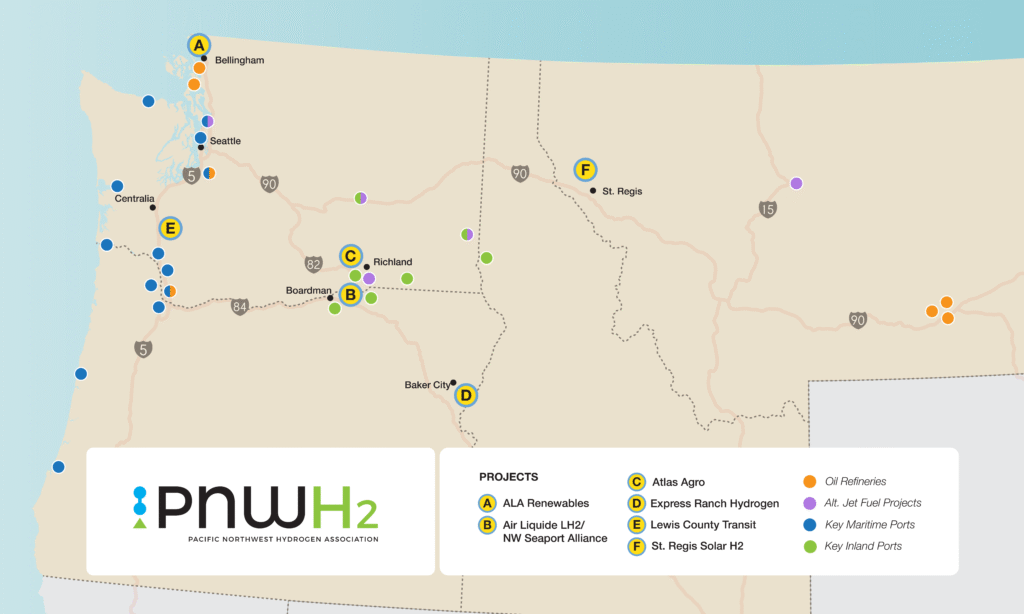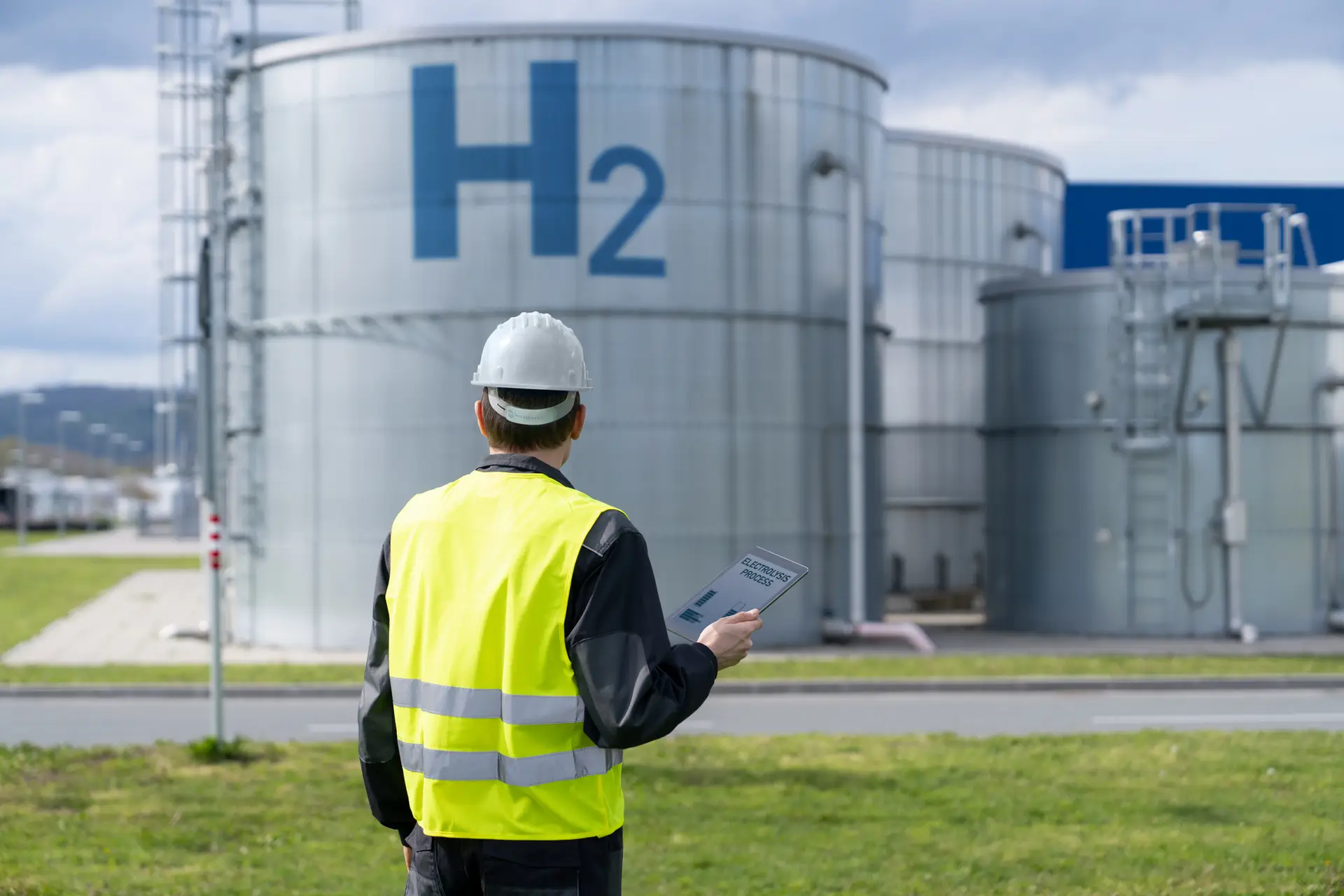The PNWH2 Hub’s proposed projects will work collectively to produce, store, transport, and utilize hydrogen.
PNWH2 Project Map


HUB PROJECT LOCATIONS
The proposed PNWH2 Hub spans six project sites – three locations in Washington, one location in Oregon and one location in Montana.
In partnership with labor, Tribal Nations, and public and private sector partners, the Hub will harness the Northwest’s innovative technology and abundant resources to create jobs and improve lives while unlocking untapped potential for the region’s industries, agriculture, transportation and infrastructure.
The final project locations of the PNWH2 Hub will be determined through negotiations with the U.S. Department of Energy. During this process, some aspects of the Hub’s scope and scale may change so limited information about the projects will be shared publicly. We will provide more details and collaborate with local communities and regulators on siting and permitting once locations are finalized.
| Project | Expected Location | Expected End Use |
|---|---|---|
| A | Bellingham, WA | Heavy-Duty Transportation, Refining & Power Generation |
| B | Port of Morrow, OR | Heavy-Duty Transportation |
| C | Richland, WA | Agriculture |
| D | Baker City, OR | Heavy-Duty Transportation |
| E | Chehalis, WA | Public Transit |
| F | St. Regis, MT | Heavy- Duty Transportation |
A LONG-TERM EFFORT
The PNWH2 Project Timeline.

Establishing the Pacific Northwest Hydrogen Hub will be a long-term effort with our proposed projects coming online as soon as feasible following the U.S. Department of Energy’s multi-phase process, including the government providing go/no-go decisions at each stage.
The timeline for H2Hubs has been defined by the U.S. Department of Energy. In alignment with this guidance, we are working to bring PNWH2 projects online as soon as possible.
Hydrogen Hub Application Process
- November 2021 – The Infrastructure Law is signed into law by President Biden. The law appropriates $7 billion to the U.S. Department of Energy (DOE) to develop a nationwide network of Clean Hydrogen Hubs (H2Hubs).
- March 2022 – The Pacific Northwest Hydrogen Association is incorporated.
- July 2022 – The first Pacific Northwest Hydrogen Association Board of Directors meeting is held.
- November 2022 – The Pacific Northwest Hydrogen Association submits a Hub concept paper to the DOE’s Office of Clean Energy Demonstrations (OCED).
- December 2022 – DOE encourages 33 of 79 organizations that submitted concept papers, including PNHW2 Hub, to prepare a full application for the Regional Clean Hydrogen Hub Program Funding Opportunity Announcement.
- April 2023 – PNWH2 Hub submits its full application to DOE. The proposal is developed by a team of experts from each proposed project led by federal engineering, procurement and construction contractor AtkinsRealis. Guidance is provided by the Pacific Northwest Hydrogen Association Board of Directors and Advisory Committee, as well as through community and partner feedback.
- October 2023 – DOE selects PNWH2 Hub for negotiation of award.
- July 2024 – Following negotiations, PNWH2 Hub granted Phase 1 Award status from DOE, officially authorizing it to proceed with detailed project planning during Phase 1, starting in Q3 2024.
- August 2024 – Present – The PNWH2 Hub is advancing Phase 1 implementation with projects while continuing engagement with DOE in preparation for its Phase 2 application.
H2Hubs Phases
Phase 1 – Phase 1 is anticipated to last one year and will encompass initial planning and analysis activities to ensure that the overall H2Hub concept is technologically and financially viable, building on existing engagement with local communities to include further input from tribes and relevant partners and stakeholders.
Phase 2 – Phase 2 is anticipated to take up to two years and includes finalizing engineering designs and business development, site access, labor agreements, permitting, offtake agreements and community engagement activities.
Phase 3 – Phase 3 is anticipated to last approximately 2-4 years and will focus on the implementation – installation, integration and construction activities.
Phase 4 – Phase 4 is anticipated to take approximately 2-4 years and will ramp up the H2Hub to full operations, including data collection to analyze the H2Hub’s operations, performance and financial viability.
A PUBLIC + PRIVATE COLLABORATION
PNWH2 Project Funding.

The U.S. Department of Energy (DOE)’s Hydrogen Hub initiative offers a rare opportunity to create public-private partnerships at a regional scale, broadening the U.S.’ energy portfolio and creating high-paying energy careers as part of a new hydrogen economy.
The PNWH2 Hub is eligible to receive up to $1 billion in federal funding over four DOE-defined development phases spanning nine years, with $27.5 million awarded in 2024 for Phase 1. DOE’s H2Hubs program requires each Hub to provide at least 50% or more of the total project cost, and over 75% of the Pacific Northwest Hydrogen Hub cost-share funds are expected to be provided by private sector partners.
Regionally, Washington state contributed $2 million in 2022 toward Hub planning, and Washington and Oregon provided resources and staff support for the launch of the PNWH2 Hub. Washington committed an additional $20 million in state funding in 2024, contingent upon award.
Within a decade, the federal investment will help lower hydrogen production costs in our region and nationwide and establish a network of production, storage and distribution infrastructure. Those advancements will accelerate the use of hydrogen.
Projects: Frequently Asked Questions
How were the projects selected to be in the PNWH2 Hub?
In 2022, we issued three Requests for Interest (RFIs) for organizations to submit projects for review and potential inclusion in the Pacific Northwest Hydrogen Hub.
Our Project Selection Committee recommended projects to the board that best met the Hub criteria provided by the U.S. Department of Energy, leveraged the region’s resources and reflected the Pacific Northwest Hydrogen Association’s vision for strong collaboration with tribal and local stakeholders.
Where will the hydrogen be used?
We plan to use all the hydrogen produced by the PNWH2 Hub in the Pacific Northwest. In partnership with labor, Tribal Nations, and public and private sector partners, the Hub will harness the Northwest’s innovative technology and abundant resources to create jobs and improve lives while unlocking untapped potential for the region’s industries, agriculture, transportation and infrastructure.
What major end uses will be supported?
The PNWH2 Hub will create a robust network of hydrogen suppliers and end-users focused on sectors important to our region’s economy, such as heavy-duty transportation, port operations, agriculture, oil refining, sustainable aviation fuel and industrial operations.
Strategic placement of hydrogen projects in rural communities, meanwhile, brings economic opportunities to these areas, with the growing hydrogen ecosystem raising the region’s profile to nascent industries like data centers that need substantial energy inputs to thrive.
We also expect hydrogen will be available for use by individuals and organizations in within these industries. The specific cost will be driven by operating and capital costs determined by final feedstock (electricity) contracts and factors such as materials and construction costs.
What progress have projects been making?
Projects have been hard at work on Phase 1’s initial planning, permitting, analysis, design and community and labor engagement activities. This work builds on existing engagement with local communities to include further input from tribes, partners and stakeholders.
PNWH2 also continues to make progress on hydrogen market development initiatives with various end-use industry and transportation verticals, both in the region and in coordination with the other H2Hubs around the country.
What steps will follow once Phase 1 is complete?
Following the completion of Phase 1 activities, the U.S. Department of Energy will evaluate the Hub’s progress and deliver a go/no-go decision for moving to Phase 2.
Phase 2 may last up to two years and includes finalizing engineering designs and business development, site access, labor agreements, permitting, offtake agreements and community engagement activities.
During Phase 3, approximately two to four years, the Hub will focus on the implementation – installation, integration and construction activities.
Finally, Phase 4, another two to four years, will ramp up the PNWH2 Hub to full operations, including data collection to analyze the Hub’s operations, performance and financial viability.
Is aviation fuel included?
At this time, the PNWH2 Hub has no aviation-related projects as part of our proposal, although offtake customers may use our clean hydrogen at airports or to make sustainable aviation fuel. Keep in mind that this is a 10- to 15-year effort. We anticipate there may be a lot of change and discovery throughout the life of this endeavor, and we are excited to be part of the journey.